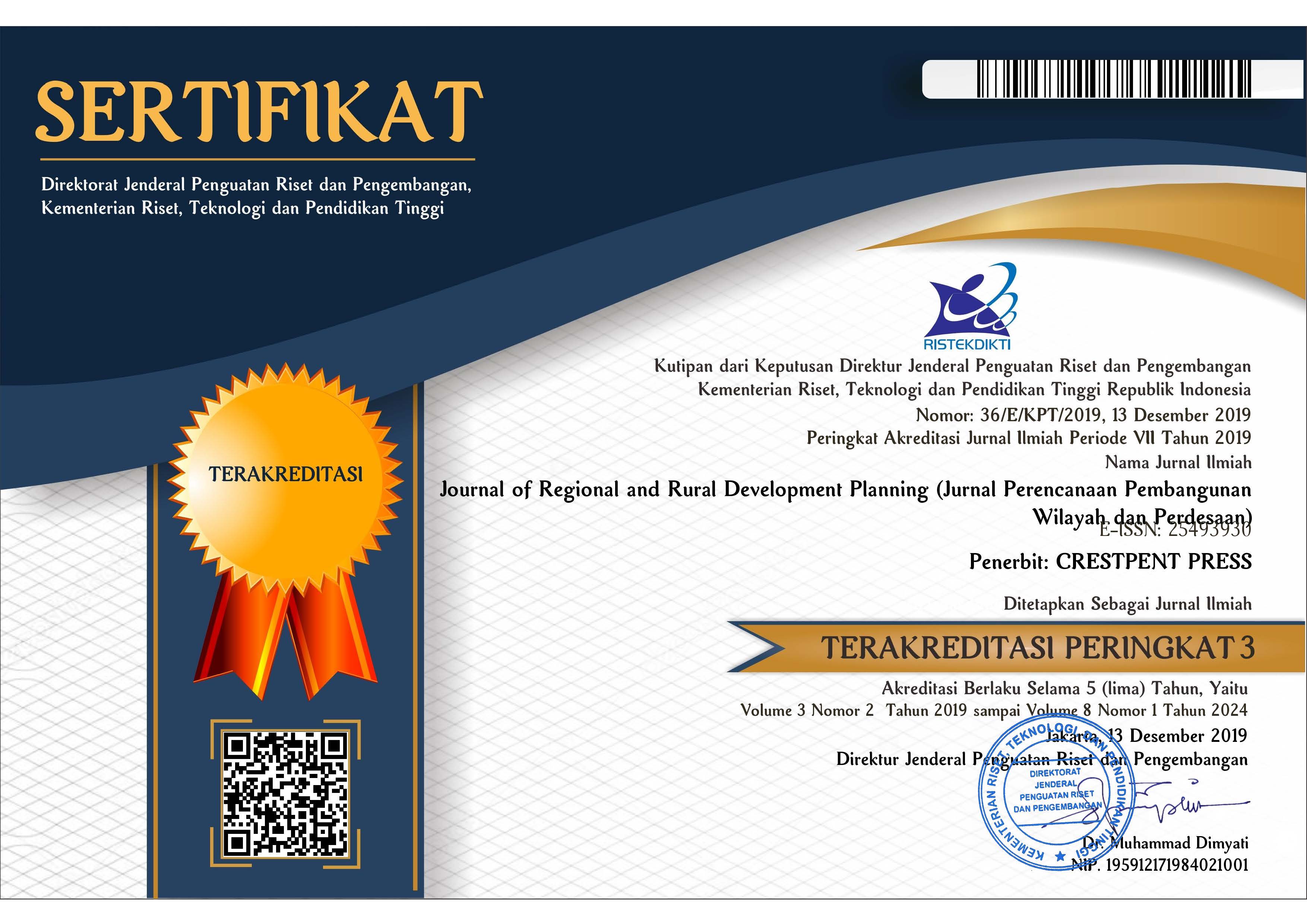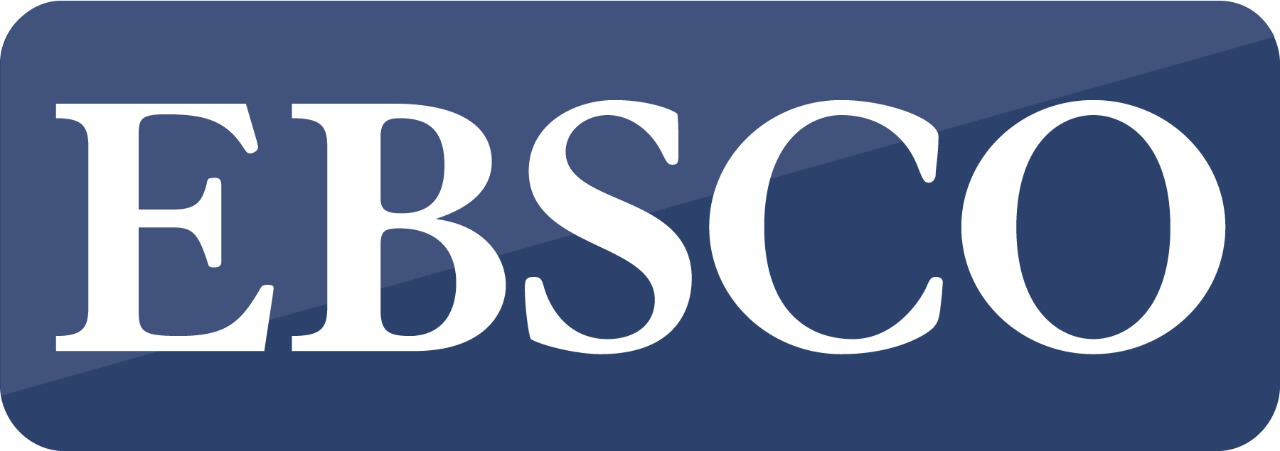Pengembangan Kelembagaan dan Pembiayaan Geopark di Indonesia: Tantangan dan Strategi
Geopark Institutional Development and Financing in Indonesia: Challenges and Strategies
Abstract
Geopark development is one of the national priority programs currently being intensified by the government at both the central and regional levels. There are three pillars of geopark development, namely conservation, economy (tourism), and education, that form the basis for sustainable regional development. This research focuses on institutional development and financing with case studies in Indonesia. Methods used in this research include literature study, online surveys to the Geopark Management Agency in Indonesia, and focus group discussions with experts and the central and regional governments. A content analysis was carried out with a descriptive approach to formulate alternative strategies for institutional development and financing in Indonesia. Results of this research show that institutions are the key to achieving independent, professional, and sustainable governance. In terms of financing, the Geopark management agency needs to be proactive in increasing alternative sources of financing such as innovation in geoproducts and geoservices, opportunities for collaboration with the private sector and the community, grant and loan, geo-sites assets management and others.
References
Ahmadi, M., Farhadinia, M. S., Cushman, S. A., Hemami, M.-R., Nezami Balouchi, B., Jowkar, H., & Macdonald, D. W. (2020). Species and space: a combined gap analysis to guide management planning of conservation areas. Landscape Ecology, 35(7), 1505-1517. doi:10.1007/s10980-020-01033-5
Andriany, S. S., Fatimah, M. R., & Hardiyono, A. (2016). Geowisata Geopark Ciletuh: Geotrek Mengelilingi Keindahan Mega Amfiteater Ciletuh (The Magical of Ciletuh Amphitheater). Bulletin of Scientific Contribution: GEOLOGY, 14(1), 75-88.
Apriliani, A., Rahmawati, R., & Azahari, R. (2019). Kemitraan Pemerintah dan Swasta dalam pengembangan wisata Geopark Ciletuh-Palabuhan Ratu Kabupaten Sukabumi. Administratie Jurnal Administrasi Publik, 1(1).
Azman, N., Halim, S. A., Liu, O. P., Saidin, S., & Komoo, I. (2010). Public education in heritage conservation for geopark community. Procedia-Social Behavioral Sciences, 7, 504-511.
Bakti, I., Sumartias, S., Damayanti, T., & Nugraha, A. R. (2018). Pengembangan model komunikasi pariwisata berbasis kearifan lokal di kawasan geopark Pangandaran. Jurnal Kajian Komunikasi, 6(2), 217-230.
Bangun, M., & Junita, D. (2020). Strategi Pengembangan Kawasan Geosite Kaldera Toba Pasca Penetapan Sebagai UNESCO Global Geopark. Jurnal Social Opinion: Jurnal Ilmiah Ilmu Komunikasi, 5(2), 213-225.
Bappenas. (2020). Peraturan Menteri Perencanaan Pembangunan Nasional/Kepala Badan Perencanaan Pembangunan Nasional Nomor 15 Tahun 2020 Tentang Rencana Aksi Nasional Pengembangan Taman Bumi (Geopark) Indonesia Tahun 2021-2025. Indonesia
Burlando, M., Firpo, M., Queirolo, C., Rovere, A., & Vacchi, M. (2011). From geoheritage to sustainable development: strategies and perspectives in the Beigua Geopark (Italy). Geoheritage, 3(2), 63-72.
Canesin, T. S., Brilha, J., & Díaz-Martínez, E. (2020). Best Practices and Constraints in Geopark Management: Comparative Analysis of Two Spanish UNESCO Global Geoparks. Geoheritage, 12(1), 14. doi:10.1007/s12371-020-00435-w
Cheung, L. T., Fok, L., & Fang, W. (2014). Understanding geopark visitors' preferences and willingness to pay for global geopark management and conservation. Journal of Ecotourism, 13(1), 35-51.
Darsiharjo, D. (2016). Pengembangan Geopark Ciletuh berbasis partisipasi masyarakat sebagai kawasan geowisata di kabupaten Sukabumi. Jurnal Manajemen Resort dan Leisure, 13(1).
Doucek, J., & Zelenka, J. (2018). New Trends in Geoproducts Development: Železné Hory National Geopark Case Study. Czech Journal of Tourism, 7(2), 179-195.
Dowling, R. K., & Newsome, D. (2017). Geotourism destinations-visitor impacts and site management considerations. Czech Journal of Tourism, 6(2), 111-129.
Du, Y., & Girault, Y. (2018). A genealogy of UNESCO global geopark: Emergence and evolution. International Journal of Geoheritage Parks, 6(2), 1-17.
Eklund, J., Arponen, A., Visconti, P., & Cabeza, M. (2011). Governance factors in the identification of global conservation priorities for mammals. Philosophical Transactions of the Royal Society B: Biological Sciences, 366(1578), 2661-2669.
Farsani, N. T., Coelho, C., & Costa, C. (2011). Geotourism and geoparks as novel strategies for socio‐economic development in rural areas. International Journal of Tourism Research, 13(1), 68-81.
Farsani, N. T., Coelho, C. O. A., Costa, C. M. M., & Amrikazemi, A. (2014). Geo-knowledge Management and Geoconservation via Geoparks and Geotourism. Geoheritage, 6(3), 185-192. doi:10.1007/s12371-014-0099-7
Fassoulas, C., Mouriki, D., Dimitriou-Nikolakis, P., & Iliopoulos, G. (2012). Quantitative Assessment of Geotopes as an Effective Tool for Geoheritage Management. Geoheritage, 4(3), 177-193. doi:10.1007/s12371-011-0046-9
Fauzi, N. S. M., & Misni, A. (2016). Geoheritage Conservation: Indicators affecting the condition and sustainability of Geopark–a conceptual review. Procedia-Social Behavioral Sciences, 222, 676-684.
Gerlagh, R., & van der Zwaan, B. C. (2001). The effects of ageing and an environmental trust fund in an overlapping generations model on carbon emission reductions. Ecological Economics, 36(2), 311-326.
Ginting, N., & Sasmita, A. (2018). Developing tourism facilities based on geotourism in Silalahi Village, Geopark Toba Caldera. Paper presented at the IOP Conference Series: Earth and Environmental Science.
Hindersah, H., Asyiawati, Y., Akliyah, L. S., & Ramadhan, T. A. (2017). Tantangan Pembangunan Pariwisata Inklusif Geopark Ciletuh, Desa Ciwaru Kabupaten Sukabumi–Provinsi Jawa Barat. Paper presented at the Prosiding-Seminar-Nasional-Perencanaan-Pembangunan-Inklusif-Desa-Kota.
Koh, Y.-K., Oh, K.-H., Youn, S.-T., & Kim, H.-G. (2014). Geodiversity and geotourism utilization of islands: Gwanmae Island of South Korea. Journal of Marine Island Cultures, 3(2), 106-112.
Larwood, J. G., Badman, T., & McKeever, P. J. (2013). The progress and future of geoconservation at a global level. Proceedings of the Geologists' Association, 124(4), 720-730. doi:https://doi.org/10.1016/j.pgeola.2013.04.001
Management, G. (2020). Governance & Management. Retrieved from https://www.geoparktoolkit.org/
Moser, A., & Korstjens, I. (2018). Series: Practical guidance to qualitative research. Part 3: Sampling, data collection and analysis. European Journal of General Practice, 24(1), 9-18.
Nasution, I. (2019). Persepsi Publik Tentang Destinasi Pariwisata Danau Toba Sebagai Global Geopark Kaldera UNESCO. Publikauma: Jurnal Administrasi Publik Universitas Medan Area, 7(2), 88-102.
O. Nyumba, T., Wilson, K., Derrick, C. J., & Mukherjee, N. (2018). The use of focus group discussion methodology: Insights from two decades of application in conservation. Methods in Ecology evolution, 9(1), 20-32.
Pásková, M., & Zelenka, J. (2018). Sustainability management of unesco global geoparks. Sustain. Geosci. Geotourism, 2, 44-64.
Saputra, I. G. G. (2016). Respon Wisatawan Terhadap Pengembangan Batur Global Geopark Bali. Jurnal Master Pariwisata.
Sekretariat Kabinet Republik Indonesia. (2019). Peraturan Presiden Nomor 9 Tahun 2019 Tentang Pengembangan Taman Bumi (Geopark). Jakarta, Indonesia: Sekretariat Kabinet.
Sekretariat Negara Republik Indonesia. (2010). Peraturan Pemerintah Nomor 36 Tahun 2010 Tentang Pengusahaan Pariwisata Alam Di Suaka Margasatwa Taman Nasional Taman Hutan Raya Dan Taman Wisata Alam. Jakarta, Indonesia: Sekretariat Negara.
Sekretariat Negara Republik Indonesia. (2011). Peraturan Pemerintah Nomor 50 Tahun 2011 Tentang Rencana Induk Pembangunan Kepariwisataan Nasional Tahun 2010-2025. Jakarta, Indonesia: Sekretariat Negara.
Shekhar, S., Kumar, P., Chauhan, G., & Thakkar, M. (2019). Conservation and sustainable development of geoheritage, geopark, and geotourism: a case study of Cenozoic successions of Western Kutch, India. Geoheritage, 11(4), 1475-1488.
Van Geert, F., & Parks. (2019). The uses and challenges of the geopark label as a place branding tool. The case of the Geopark of the Tremp Basin-Montsec (Catalonia-Spain). International Journal of Geoheritage, 7(2), 72-84.
Wang, D., & Ap, J. (2013). Factors affecting tourism policy implementation: A conceptual framework and a case study in China. Tourism Management, 36, 221-233. doi:https://doi.org/10.1016/j.tourman.2012.11.021
Wang, L., Tian, M., & Wang, L. (2015). Geodiversity, geoconservation and geotourism in Hong Kong Global Geopark of China. Proceedings of the Geologists' Association, 126(3), 426-437. doi:https://doi.org/10.1016/j.pgeola.2015.02.006
Wibowo, Y. G., Zahar, W., Syarifuddin, H., & Ananda, R. (2019). Pengembangan Eco-Geotourism Geopark Merangin Jambi. IJEEM-Indonesian Journal of Environmental Education Management, 4(1), 23-43.
Copyright (c) 2022 Journal of Regional and Rural Development Planning (Jurnal Perencanaan Pembangunan Wilayah dan Perdesaan)

This work is licensed under a Creative Commons Attribution-ShareAlike 4.0 International License.




.png)














